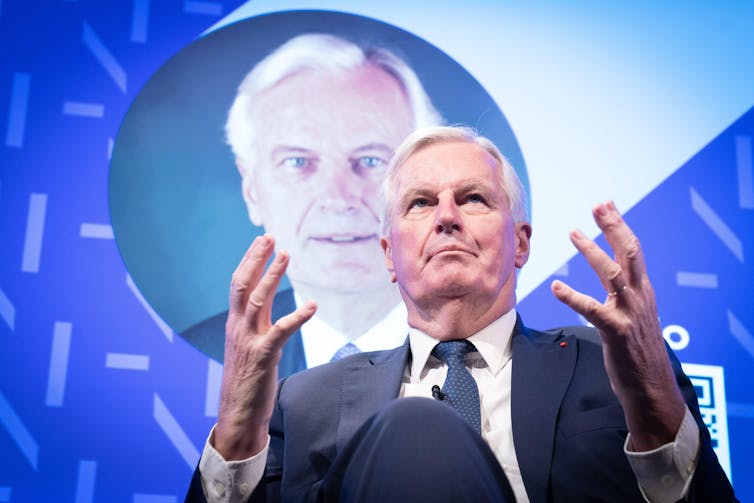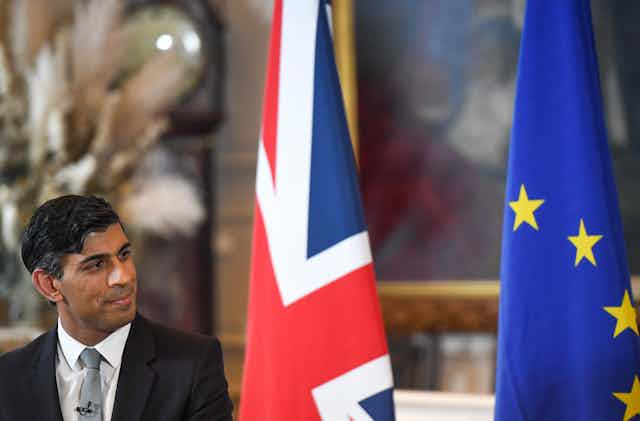Michel Barnier, the EU’s former chief Brexit negotiator, has suggested that the time is now right for the UK and EU to sign a treaty on defence and foreign policy cooperation.
This is the clearest indication yet that the EU is interested in cultivating a new and improved foreign affairs relationship with the UK after Brexit. The bad news, however, is that the smoke signals from Brussels are unlikely to be positively received by the present UK government. Britain simply isn’t willing to consider a formal collaboration in these areas.
As will be remembered, the governments of Boris Johnson and Liz Truss took an unhelpfully combative approach towards Brussels, making talk of cooperation difficult.
Relations have certainly warmed between London and Brussels under Rishi Sunak, particularly after his signing of the the Windsor framework to simplify the labyrinth of trading rules between the EU, mainland Britain and Northern Ireland.
Strong showings at bilateral and multilateral get-togethers with European leaders followed. This arguably refreshed diplomatic energy between both sides, opening the door to new forms of UK-EU cooperation, and even partnership.
But handshakes alone won’t cut it in a world where major security threats are global, from war to cybersecurity and terrorism.
The problem is that the UK government is simply not in listening mode. Despite an early inclusion of foreign policy and defence cooperation in the initial October 2019 political declaration on the future UK-EU relationship, the UK government subsequently changed its mind. It then hardened its attitude to any form of official dialogue, tool or forum permitting overarching UK-EU foreign affairs to be discussed.
Indeed, throughout the entire period of Brexit negotiations, it remained so steadfastly uninterested that it deliberately constructed the landmark post-Brexit EU-UK trade and cooperation agreement (TCA) in a way that would shut out any form of foreign, security and defence cooperation. The agreement explicitly states that “formal foreign and defence policy” is not part of the deal.
Rather than an institutional framework, or an agreement built into a treaty – like the TCA – the UK government opted for an intrinsically case-by-case, ad-hoc approach to foreign policy, security and defence cooperation between London and Brussels.
This decision reduced at a stroke any ability from 2020 onwards for Britain to realign formally with Brussels in any of these areas post-Brexit. And so it has remained.

Some shifting of deckchairs has left the Conservative party more towards the centre than the hard right in reappraising relations with Brussels but the government still remains cool to any such overtures. And opportunities have arisen in various forums, including the European Political Community, and suggestions made by EU leaders including European Council president Charles Michel that close collaboration is vital.
But the UK had rebuffed such advances. Party politics still loom large, it seems, with the result that “domestic political concerns in the ruling Conservative party about being seen to move too close to Brussels” are still paramount, as one UK official put it. That forecloses any suggestion of a treaty and even a loose dialogue on defence.
A changing picture
As with so much in international affairs however, broader events have a habit of disrupting plans. In a bittersweet turn of fate, the illegal invasion of Ukraine in February 2022 has transcended the UK’s preferred arms-length approach to foreign policy relations with the EU.
The war demands resolute diplomatic, security and defence cooperation between the UK and European partners, both in and beyond the traditional forum of Nato. From cooperating with the EU on sanctions against Russia, providing lethal and non-lethal aid to Ukraine, to supporting broader European war aims in other forums including the G7, the Ukraine war has helped “put the wiring back in” between London, Brussels, and other European capitals. A treaty may not be forthcoming but, in practice, security relations have deepened.
The UK has even felt involved enough to commit to Pesco (permanent structured cooperation). This long-standing EU project is geared towards simplifying the logistics of cross-Europe troop and hardware transport. The UK’s decision to join in late 2022 is indicative of closer defence cooperation via specific projects if not via institutionalised agreements.
Can the exigencies of Ukraine, combined with the wider regional and global security demands, and the first steps towards defence cooperation with the EU combine to prompt a change of heart by the UK government? Barnier certainly seems to think so. In his view, both the circumstances and time are right:
Looking at the situation in Africa, looking at the war in Ukraine, looking at the new challenges for our security and the stability of the Continent — I think it would be in our common interest to negotiate a new treaty on defence, external policy, foreign policy and cooperation between the UK and the EU.
Certainly cross-Channel cooperation has reached satisfyingly cooperative new heights in the past few months. But the TCA – essentially the sole foundation of post-Brexit UK-EU relations – remains a complex, imperfect instrument.
It excludes much by way of police and judicial cooperation, with scope for ongoing rifts and spats on everything from fisheries to trade. And at this point, the UK government appears to have little appetite to establish a wholly new dialogue beyond the TCA to discuss any forms of bilateralism. The TCA’s scheduled review in 2025 may provide the next opportunity, but world events may simply not wait that long.
Upcoming elections in the UK (and indeed the EU), however, may prove catalytic in reappraising both need, and urgency, for a more formal and practical UK-EU foreign and security policy.

